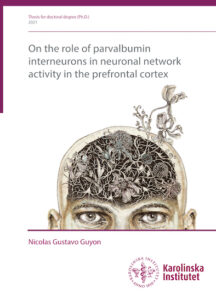CONGRATULATIONS to PhD student Josina van Lunteren who defended her thesis Dec 3, 2021 !
Title:
Inhibition in cognition: neurophysiology and connectivity of GABAergic interneurons in the prefrontal cortex
Opponent:
Nelson Totah, PhD, Helsinki University, Finland
Board:
Karima Chergui, PhD (chair), Karolinska Institutet, Sweden
Torkel Hafting, PhD, Oslo University, Norway
Daniella Ottosson, PhD, Lund University, Sweden
Link to thesis HERE
THE MOUSE PREFRONTAL CORTEX: UNITY IN DIVERSITY. Neuron 2021
In this Perspective, Pierre Le Merre, Sofie Ährlund-Richter and Marie Carlén provide a new comprehensive view of structural and functional distinctions of the mouse prefrontal cortex (PFC) and emphasize the relevance of studying the PFC as a whole to unravel the integrative cognitive functions of this brain region.
– A research synthesis of 100 recent publications (2011-2020) utilizing in vivo perturbation of behavior is included, and the results question absolute localized functions in the PFC.
– Analyzed large-scale connectivity data indicate that the PFC is a module, holding a few larger subdivisions defined by their whole-brain connectivity.
The Perspective also covers neuronal correlates to cognitive functions of the mouse PFC and cellular mechanisms underlying PFC feedback modulation of downstream regions. Neuron 2021 Jun 16;109(12):1925-1944. Pdf HERE
Dec 2021. POSTDOCTORAL STUDIES in neuroscience - in vivo.
This position will be posted in Karolinska Institutets job application system the first week of December 2021.
Division
The position regards the lab of Marie Carlén, associate professor in the Department of Neuroscience, Karolinska Institutet, Campus Solna. Utilizing a systems neuroscience approach the lab of Marie Carlén studies the cellular logic of information processing in the prefrontal cortex (PFC) with the aim to elucidate what the PFC is and how it works. The studies are mainly performed in behaving mice using large-scale electrophysiological recordings or calcium imaging of neuronal activity. Optogenetics and circuit tracing are other central technologies, as is slice electrophysiology. The lab is recognized for its discoveries on inhibitory interneurons expressing parvalbumin and their role in cortical oscillations, cognition, and behavior.
Duties
The hired postdoc will expand our studies on the structure and function of the PFC, with a focus on electrophysiological in vivo investigations in behaving mice. An important aspect of the work regards reconciling of structural and functional traits of the PFC, and elucidation of central principles underlying PFC’s key role in cognition. The work includes circuit studies using viral approaches and transgenic mice, and studies of PFCs interactions with, and influence over, other brain regions. Analysis of advanced electrophysiological and circuit tracing data, including high-dimensional datasets, is an important part of the work, requiring programming skills.
Applicant profile
We are seeking to recruit a highly motivated and experienced researcher with documented expertise (including 1st author publications) aligning to the outlined duties. Close collaboration, open and honest communication, and active contribution to the theoretical aspects of the research are expected, as is the ability to plan and work independently. Apart from the required expertise, the applicant is expected to hold animal work certification in accordance with current Swedish and/or European legislations, and to be fluent in English (spoken and written). Proficiency in programming and documented experience of advanced data analysis is meriting. Applicants should hold doctoral and/or postdoctoral experience and expertise with relevance to the outlined duties.
Location: Karolinska Institutet, Biomedicum, Campus North, Stockholm, Sweden
Dec 2021. POSTDOCTORAL STUDIES in neuroscience - ex vivo
This position will be posted in Karolinska Institutes job application system the first week of December 2021.
Division
The position regards the lab of Marie Carlén, associate professor in the Department of Neuroscience, Karolinska Institutet, Campus Solna. Utilizing a systems neuroscience approach the lab of Marie Carlén studies the cellular logic of information processing in the prefrontal cortex (PFC) with the aim to elucidate what the PFC is and how it works. The studies are mainly performed in behaving mice using large-scale electrophysiological recordings or calcium imaging of neuronal activity. Optogenetics and circuit tracing are other central technologies, as is slice electrophysiology. The lab is recognized for its discoveries on inhibitory interneurons expressing parvalbumin and their role in cortical oscillations, cognition, and behavior.
Duties
The hired postdoc will be responsible for our ex vivo studies (e.g., electrophysiology and voltage imaging in brain slices) complementing our in vivo work on the functions of the PFC. A central theme regards cellular mechanisms involved in learning – processes underlying organisms’ dynamic behavioral adaptations to ever changing environmental affordances. The hypothesis that the PFC directs the dynamic and long-term adaptions in synaptic transmission underlying learning processes will be addressed. The recruited researcher will also contribute to our further studies of the cellular underpinnings of the generation of cortical oscillations. The work also requires and involves in vivo approaches, including circuit targeting and labelling in transgenic rodents. There are also great possibilities to be involved in in vivo registration of neuronal activity in behaving animals, e.g., using high-density electrophysiology or 2-photon imaging.
Applicant profile
We are seeking to recruit a highly motivated and experienced researcher with documented doctoral and/or postdoctoral experience and expertise (including 1st author publications) aligning to the outlined duties. Close collaboration, open and honest communication, and active contribution to the theoretical aspects of the research are expected, as is the ability to plan and work independently. Apart from the required expertise, the applicant is expected to be fluent in English (spoken and written). Proficiency in programming and documented experience of advanced data analysis, particularly electrophysiological data, is meriting.
July 2021. Review article: Spatial Transcriptomics: Molecular Maps of the Mammalian Brain. Annual Review of Neuroscience.
May 4 2021. Maps of the nervous system inspire experiments and theories in neuroscience. Spatial transcriptomics has opened up a new era in neuroanatomy, where the unsupervised and unbiased exploration of the molecular signatures of tissue organization will give rise to a new generation of brain maps. Here we review the technological and conceptual advances made possible by spatial transcriptomics in the context of advancing neuroanatomy and discuss how molecular neuroanatomy can redefine mapping of the nervous system. We propose that classification of brain regions on the basis of their gene expression profile can circumvent subjective neuroanatomical definitions and produce common reference frameworks that can incorporate cell types, connectivity, activity, and other modalities.
Spatial Transcriptomics: Molecular Maps of the Mammalian Brain
Cantin Ortiz, Marie Carlén and Konstantinos Meletis
Annual Review of Neuroscience. 2021 Apr 29. doi: 10.1146/annurev-neuro-100520-082639. Online ahead of print. PMID:33914592
Nicolas Guyon, PhD student in the CarlenLab defended his thesis May 21 2021!


Opponent: Kathleen Cho, UCSF, CA, USA.
Committee:
Victoria Puig Velasco, Mar Institute for Medical Research Barcelona, Spain.
Paolo Medini, Umeå University, Umeå, Sweden
Rochellys Diaz Heijtz, Karolinska Institutet, Stockholm, Sweden
CONGRATULATIONS NICO!
2021 Feb 2x Guyon N et al are out!
Network asynchrony underlying increased broadband gamma power
Nicolas Guyon, Leonardo Rakauskas Zacharias, Eliezyer Fermino de Oliveira, Hoseok Kim, João Pereira Leite, Cleiton Lopes-Aguiar and Marie Carlén
Journal of Neuroscience 2021 Mar 31;41(13):2944-2963. LINK
Adult trkB signaling in pavalbumin interneurons is essential to prefrontal network dynamics
Nicolas Guyon, Leonardo Rakauskas Zacharias, Josina Anna van Lunteren, Jana Immenschuh, Janos Fuzik, Antje Märtin, Yang Xuan, Misha Zilberter, Hoseok Kim, Konstantinos Meletis, Cleiton Lopes-Aguiar and Marie Carlén
Journal of Neuroscience 2021 Apr 7;41(14):3120-3141. LINK
2021 Feb BOOK CHAPTER: Neuronal oscillations and the mouse prefrontal cortex
Felix Jung, PhD student in the lab, and Marie Carlén review findings on the role of neuronal oscillations in prefrontal functioning, with a specific focus on research in mice. We discuss discoveries pertaining to local prefrontal processing, as well to interactions with other brain regions. We also discuss how the recent discovery of brain-wide respiration-entrained rhythms (RR) warrant re-evaluation of certain findings on slow oscillations (<10 Hz) in prefrontal functioning.
Neuronal oscillations and the mouse prefrontal cortex.
Jung F, Carlén M.
(2021) International Review of Neurobiology.
ISSN 0074-7742. Elsevier Inc. https://doi.org/10.1016/bs.irn.2020.11.005
2021 Feb Katharina Heining joins the CarlenLab
Feb 1 2021
Katharina Heining joins the CarlénLab as postdoctoral researcher!
Katharina will work on the project ”A functional map of the mouse prefrontal cortex” and is funded by a postdoctoral fellowship from the Wenner-Gren Foundations. Link to the foundation HERE
Welcome Katharina!
2020 Sep CarlenLab receives 32.2M SEK grant
Sep 30 2020
The CarlénLab receives 3.0M€ (32.2M SEK) for the project ”Brain circuits in decision-making” from the Knut & Alice Wallenbergs Foundation!
The project will run over 5 years and be conducted in collaboration with the lab of KONSTANTINOS MELETIS. The interactions between the prefrontal cortex and the striatum will be studied with large-scale electrophysiology and calcium imaging in behaving mice.
Link to funded KAW projects 2020 here
2020 Sep Sofie Ährlund-Richter receives the Brain Diseases Award 2020
CarlenLab alumni Sofie Ährlund-Richter receives the Brain Diseases Award 2020 from the UZH Foundation for her PhD thesis work ’On the neuronal correlates of cognition; cell-type specific circuitry and function of the prefrontal cortex!
Congratulations Sofie!
2020 Aug Marina Slashcheva selected for the MSCA ITN position
August 2020
UPDATE: Marina Slashcheva has been selected for the PhD position in the CarlenLab within the Marie Sklodowska-Curie Action MSC-ITN-2019 project euSNN, European School of Network Neuroscience, www.eusnn.eu
The CarlenLab received 68 applications from 23 different countries.
Welcome Marina!
2020 July The DMCdrive goes live!
July 2020
The DMCdrive goes live!
Want to long-term record and manipulate neuronal activity in freely moving mice or rats? Then we strongly recommend going for our DMCdrive holding four movable tetrodes + optical fiber, that can be built from 3D printed parts in 4h without much experience. Very reliable optotagging and recovery of single unit and LFP activities over many days.
Designed by senior researcher Hoseok Kim.
Open access to the publication here.
May 2020 Postdoc Pierre Le Merre receives StratNeuro funding for postdoctoral work
May 2020
CarlenLab postdoc Pierre Le Merre receives StratNeuro funding for postdoctoral researchers 2020!
StratNeuro, the Strategic Research Area Neuroscience joins Karolinska Institutet, The Royal Institutet of Technology (KTH) and Umeå University and has the mission to integrate clinical and basic research to foster a new generation of leaders and scientists in translational neuroscience. Read more here.
Congratulations Pierre!
2019 Sep Postdoc Pirre Le Merre receives 2019 NARSAD YIA
September 2019
CarlenLab postdoc Pierre Le Merre receives 2019 NARSAD Young Investigator Grant!
”The NARSAD Young Investigator Grants were initiated to fund innovative, cutting-edge research projects relevant to serious brain and behaviour disorders such as schizophrenia, mood disorders, anxiety disorders or child and adolescent mental illnesses.
Pierre Le Merre, from the Department of Neuroscience at Karolinska Institutet, is one of the “promising young candidates with innovative ideas within the field of mental health research” to receive the two-year grant.
The grant, which offers 35 000 USD per year for two years, will enable him to identify the neuronal determinants of working memory in the prefrontal cortex. Working memory is a core cognitive function affected in mental disorders such as schizophrenia. Therefore, this research programme aims to diagnose better and treat the cognitive deficits of schizophrenia.”